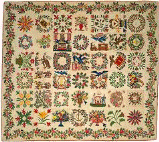Textile Society of America

Textile Society of America: Symposium Proceedings
Date of this Version
2008
Document Type
Article
Citation
Textiles as Cultural Expressions: Proceedings of the 11th Biennial Symposium of the Textile Society of America, September 24–27, 2008, Honolulu, Hawaii
Abstract
Preface
Today I will present the history of the founding of the Yuntdag cooperative in Orselli village in western Turkey. This cooperative is a member of the DOBAG Project, or the Natural Dye Research and Development Project (Dogal Boya Arastirma ve Gelistirme Projesi). DOBAG consists of two projects, one in Orselli and another in Ayvacik, both in western Turkey. By telling this story, I will show how “insiders” and “outsiders,” villagers, expatriates, textile experts, international dealers, and friends worked collaboratively to commodify a women’s heritage product and transform rural life in western Turkey.
Introduction
Harald Bohmer, who founded DOBAG in 1980, is famous for revitalizing natural dyes and inspiring similar projects around the world in new production textiles of “indigenous” or “traditional” design. DOBAG is also known for its work in sustaining women’s artistic production and economically developing rural villages. Dealers promote the project by describing the cooperative as one, which socially and culturally emancipates women, because it provides them with a steady income and forbids child labor. I leave aside the question of whether and how the project achieves these goals today, and focus on the collaborative, intercultural efforts needed to found the business.
The Ayvacik and Yuntdag Cooperatives
To understand the importance of the foundation of the Yuntdag cooperative, it is important to distinguish it from the cooperative based in Ayvacik. While both are in western Anatolia, produce knotted carpets and “kilims” (actually cicims) with hand-spun, plant-dyed wool, the Yuntdag cooperative is a “women’s” cooperative. In the Ayvacik, cooperative members are the male heads of household, with some exceptions resulting from widowhood. The weavers are all female.


Comments
Copyright 2008 by the author.